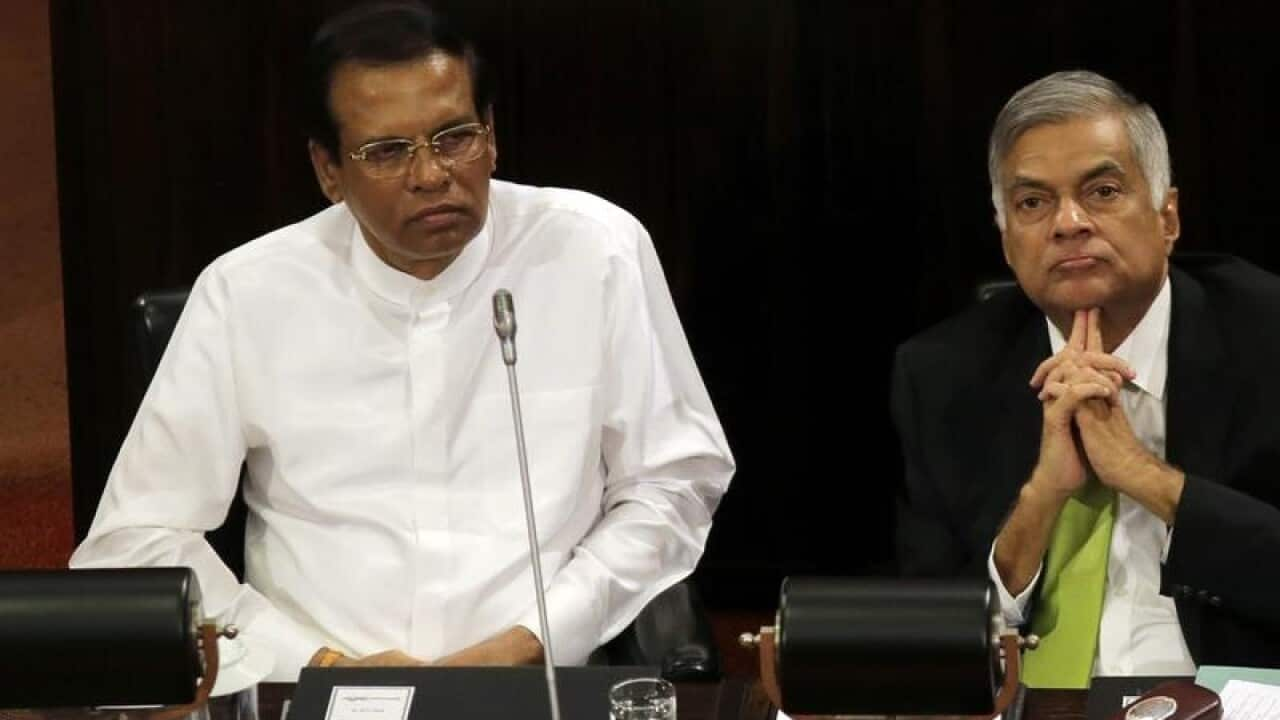Sri Lanka President Maithripala Sirisena says his security forces would "eradicate terrorism" following devastating suicide attacks on Easter Sunday and restore stability before a presidential election due by year-end.
Sirisena also said in an interview he believed Islamic State was behind the April 21 attacks, which targeted churches and luxury hotels and killed more than 250 people including 42 foreign nationals. The group has claimed responsibility. "Elections cannot be postponed, therefore before the elections I will bring about stability and I will eradicate terrorism," Sirisena told Reuters on Saturday.
"Elections cannot be postponed, therefore before the elections I will bring about stability and I will eradicate terrorism," Sirisena told Reuters on Saturday.

Sri Lankan security forces stand guard at Dawatagaha mosque during Friday prayers at Town Hall in Colombo. Source: AAP
The presidential vote is likely to take place between November 10 and December 10 and sources close to Sirisena say he would seek re-election.
"We have already identified all active members of the group and it's a case of now arresting them," Sirisena said, adding that there were a further 25 to 30 "active members" linked to the bombings still at large.
Sirisena said all indications suggested IS had been involved, adding: "It's crystal clear because after the attacks the IS organisation made an announcement claiming responsibility for the bombings."
Sri Lanka authorities have previously said they suspect the attackers had international links although the precise nature of those connections is not known.
Police have said two previously little-known groups - National Thawheedh Jamaath and Jammiyathul Millathu Ibrahim - carried out the bombings.
Sirisena said intelligence services from eight countries, including the US Federal Bureau of Investigation and Interpol, were helping Sri Lanka with the investigation.
Local intelligence officials believe Zahran Hashim, a radical Tamil-speaking preacher from the east of the Indian Ocean island nation, may have been a key player in plotting the bombings. Officials believe he was one of nine suicide bombers.
Sirisena said the military and police have made huge progress with their investigations, but emphasised that more needs to be done.
"There are another 25-30 suspects still at large, but there is no information yet to say these suspects are suicide bombers."
Scores of suspected Islamists have been arrested after the Easter attacks.
Sri Lanka's security forces were on high alert amid intelligence reports that militants were likely to strike before the start of the Islamic holy month of Ramadan, due to begin on Monday.
The government has banned women from wearing face veils under an emergency law that was put in place after the attacks.
"This is not a Sri Lanka issue, it's a global terrorist movement," Sirisena said.
"Even advanced countries like the US, Russia, UK, Germany, India and Australia together haven't been able to completely eradicate this IS global terrorism menace."
Sri Lanka's leaders, including the president, have come under heavy criticism for failing to heed warnings from Indian intelligence services - at least three in April alone - that an attack was imminent.
Critics said infighting between the president and Prime Minister Ranil Wickremesinghe had undermined the response to the militant threat. But Sirisena said he and the prime minister were co-operating on national security issues.
The tourism sector has grown rapidly in the last decade since the Sri Lankan government defeated the rebel Tamil Tigers. Around 2.5 million tourists visit the island nation each year.
"It's a big blow to the economy, as well as the tourism industry," Sirisena said. "For the economy to develop it's important tourism to return to where it was before the attacks."

